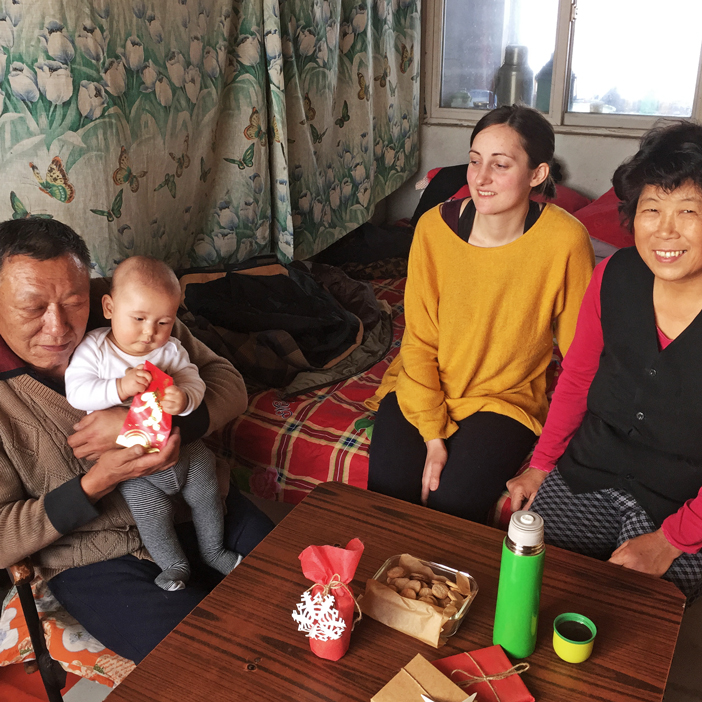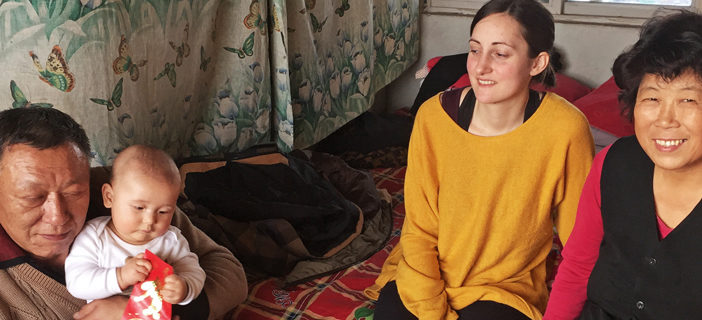Would you raise your child with the help of the grandparents?
When I recently asked my students – all Chinese women in their early 20s – which childcare options they found were good alternatives for working parents in China, offering different choices like daycare, kindergarten, grandparents or a nanny, their answers were not what I thought they’d be.
Seeing plenty of Chinese grandparents accompany their grandchildren outside to play during the day, I was surprised to hear my students’ answer. Sitting across the table in my sparsely decorated green-painted office on a hot summer day in June, 20-year-old Lisha, a tall Chinese woman from Changchun wearing a blue Korean-style blouse and khaki shorts, echoed what I had heard other students say before her. She didn’t hesitate even a little when she said the grandparents were no good childrearing option. Not a single one of the more than 10 female students I asked about suitable childcare options thought having the grandparents help out was a good idea. Not a single one. Of course, this is just a small sample, but it still gives us an interesting idea about the mind-sets of young educated Chinese women.
It is very common for Chinese grandparents to help parents with raising their grandchild. Often, grandparents will look after a child during the day when parents are at work while parents take care of the child after working-hours. It is not common, but if they aren’t retired yet, many Chinese grandparents are even more than willing to quit their job so they can take care of their grandchild. Many Chinese-mother-in-laws will move in with the family to help with childcare. Often, they will move thousands of miles across the country just so they can help out.

My husband is from Northeast China, and we live near my in-laws. We used to live in Shenzhen, short of two thousand miles from his parents hometown. We moved up north, found new jobs, and created our life here so they could help us look after our son when we work during the day. I’m positive that my mother-in-law would have moved to Shenzhen to help us look after our son, but this wouldn’t have been very ideal.
We want our 2-year-old son to have some time to get accustomed to family life as his new brother or sister is due in September, so we haven’t yet taken the step of registering him for a local kindergarten. Although we often need to re-negotiate and re-communicate child-rearing issues with the in-laws, my husband and I are both convinced that as long as our son is little, having grandparents help us take care of him and create the basis for a life-long bond between them beats having a stranger do it.
When I asked why Lisha didn’t think the grandparents were a good option, she answered fast and unhesitatingly: “Grandparents overly spoil grandkids. They love them too much.” She told me this in German – “loving a child too much”, or “太溺爱孩子” in Chinese can be translated as “to spoil a child,” but taken literally can also be translated as “to drown a child with love.”
“Drowning a child with love” – one reason why Chinese grandparents spoil their grandchildren
While spoiling grandkids probably holds true for grandparents across many cultures, I have indeed found it particularly true with Chinese grandparents. Parts of the current generation of Chinese grandparents are the parents of China’s one-child-generation. Being allowed only one child, they wanted to make sure their child wouldn’t lack anything in life. This mindset is still very widespread now that they help raise their only child’s child, their grandchild. Oftentimes, making sure the grandchildren won’t miss anything in life means that they’ll overly spoil them.

I don’t think you can love a child too much, but you can definitely spoil a child too much. This was also my husband’s and my biggest concern when we accepted my Chinese in-laws’ help with child rearing.
My mother-in-law is a 60-year-old Chinese woman with short hair regularly dyed black to cover white strains of hair. When she greets us, usually wearing black or purple, she never smiles and doesn’t show any emotion. She’s a warm-hearted person, but shows it very differently from what I’m used to from my culture. When my husband and I just got married, my mother-in-law was eagerly looking forward to having a grandchild and offered to look after her prospective grandchild in her hometown while we could keep working and have a career 2000 miles south in Shenzhen. We declined.
Accepting my in-laws’ help with child rearing

After our son was born, we moved up north. When I went back to work, we accepted their help during the day. We made sure to lay down a few ground rules, things that were really important to us, like not buying our son sweets and not adding sugar, MSG or any store-bought sauces to home-cooked meals he’d eat. Another rule is that no one may hit him. We also don’t allow our son to hit others. The latter rule has proven more difficult to execute. Our son had a phase where he’d start hitting if he couldn’t verbally communicate what he wanted. My husband and I wouldn’t allow this and hold his hands if he started hitting, but his grandmother would just sit there and let him hit her, making her his favorite target. She’d then excuse his behavior by saying he didn’t mean to hit, he was only “patting.”
Mostly, my in-laws spoil our son by not setting clear boundaries. If he says he wants to do something, then his words count. I do believe that children’s needs and emotions are important, but as grown-ups, we also need to set healthy boundaries for them. When we agreed on a time they’d bring our son back home in the afternoon, they wouldn’t bring him back for hours if he said he still wanted to play. This resulted in him spending too little time with me, not wanting to leave in the mornings, and being jealous of his dad if his dad and I were having a simple conversation, because that would mean I’d have less time to focus on him.

Although they spoil our son in some ways I disagree with, for the most part, I think there are worse ways to spoil a child. If something really bothers me, I’ll communicate about the problem as long as it takes to find a solution (and yes, sometimes it takes months of communication). They also have their own ways of showing their love which I’m sure won’t hurt our son at all. His granddad will buy him the most expensive fruit (to him, “expensive” means “good quality”), will travel all around town to buy the best kind of fish, the freshest shrimp, and the highest quality meat, and then prepares sumptuous meals for our son. They are stingy when it comes to spending money on themselves and will eat leftovers from two days earlier, but they aren’t stingy at all when it comes to their grandson. As long as they don’t force food on our son, I don’t have a problem seeing them spoil him with good and healthy food.
Even though we accepted my in-laws help, I can understand the concerns of my students. Grandparents often do spoil children, and depending on the grandparent, you might find it hard to impossible to change their way of doing things. I won’t lie and say it’s easy. It’s not. We have to communicate certain issues on a very regular basis. In accepting my in-laws’ help, to a certain degree we are also allowing them to spoil our son. But as long as they don’t go overboard with it, I’m fine with a little spoiling. After all, that’s what grandparents are known for.
Photos courtesy of Ruth Silbermayr-Song
Ruth Silbermayr-Song is an Austrian illustrator, German teacher and mother of a 2-year-old. She writes about life in China as a foreign woman, her cross-cultural marriage, and child rearing bridging cultures and languages on her blog China Elevator Stories. Her story of being pregnant and raising her son in China will appear in the anthology “Knocked Up Abroad Again – Baby bumps, twists and turns around the globe”.




